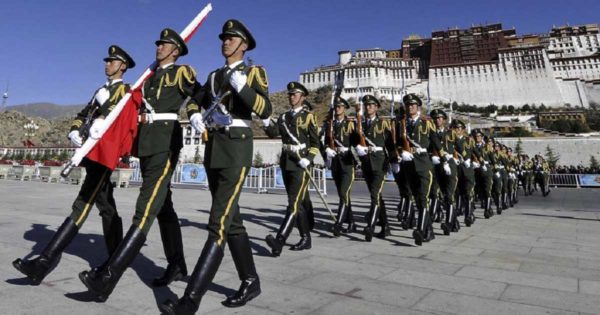The Chinese Communist Party (CCP) celebrates its centenary on July 1 with the claim of having “stood firmly against ethnic oppression and discrimination, upheld equality among all ethnic groups, and introduced regional ethnic autonomy.” Most recently in a new White Paper on Tibet, issued in May 2021, China claimed, “Tibet has broken free from its backward, autocratic, isolated past to embrace prosperity, democracy, and an open future.”
This could not be further from the truth. On the impact of Chinese rule in Tibet, the 10th Panchen Lama summed it up best when he said, “If we compare the price of the sacrifice we (Tibetans) have made with the development that we have seen, my feeling is that the value of our sacrifice has been far greater. Our sacrifice far outweighs our development.”
In fact, Tibetans are straining under the crushing weight of a totalitarian one-party dictatorship. The Tibetan people have no say in running their own affairs; all important decisions are made by the CCP and non-Tibetans dominate key leadership posts.

Chinese soldiers in Tibet. Photo: Tibetan Review
No human rights
If we look at the human rights situation, Tibetans are singled out for greater abuse because of their distinct identity. Tibetans are persecuted simply for preserving their cultural identity and face immense restrictions on their abilities to practice their religion, speak in their mother tongue, travel and exercise freedom of speech.
Chen Quanguo, party secretary in Xinjiang (known to Uyghurs as East Turkestan), who caused international outrage over his mass internment camps of Uyghurs and Kazakhs, previously held the same position in the Tibet Autonomous Region. During his tenure in TAR, he implemented policies aimed at controlling the Tibetan people, some of which are being replicated in Xinjiang today. In the 2012 detention of hundreds of Tibetan pilgrims returning from Buddhist teachings given by the Dalai Lama, we can see a forerunner to Chen’s mass internment in Xinjiang; many of the detainees were elderly men and women who were held for weeks or even months. There is deep concern about the possible establishment of coercive labor programs in Tibet. These programs could have a deep impact on the lives of Tibetans who are being uprooted from their families, their communities and their culture. In the climate of fear that persists in Tibet it is a certainty that Tibetans do not have a choice but to comply with the measures stipulated by Chinese authorities.
Sinicization of Tibetan Buddhism
Concerning religion, which lies at the core of Tibetan identity, Tibetans are being persecuted for their beliefs. Chinese authorities have subjected monks and nuns to ‘patriotic re-education’ and Tibetans can be arrested simply for owning photographs of the Dalai Lama or celebrating his birthday. Tibetan Buddhism focuses on a system of rigorous study that is being severely restricted by Chinese policies which seek to break the bond between Tibetan people and their Buddhist faith.
The Dalai Lama and the Tibetans in exile are able to share the teachings of Tibetan Buddhism with the whole world. But in Tibet under Chinese rule, Tibetan Buddhism faces threats to its survival as a result of Chinese policies; even Gyaltsen Norbu, appointed as the Panchen Lama by the Chinese state, has warned that Chinese policies could lead to a situation where Tibetan Buddhism exists in name only. The CCP’s preposterous claim to have authority over the reincarnation of the Dalai Lama is just one of the most visible efforts at sinicization, which suborns this ancient faith to Beijing’s authoritarian political goals.
Environmental degradation in Tibet
The issue of environment in Tibet is intimately linked to human rights. For Tibetans, who have lived in harmony with nature for centuries based on the principles of interdependence enshrined in their religious beliefs and customs, the degradation of the environment is a deep source of concern. China’s reckless development policies are devastating Tibet’s environment. Unchecked logging and strip mining, reckless damming, and the forced removal of Tibetan nomads from the grasslands are just some of the hallmarks of China’s stewardship of the Tibetan environment.
Dalai Lama provides vision
The Dalai Lama and Tibetan people have a vision for how Tibetan culture can benefit world civilization, but Beijing evidently sees little value in it beyond the profit of the tourism industry. In 1987 the 10th Panchen Lama observed, “There is not much attention given to the study and use of the Tibetan language. If Tibet is the most religious region, it goes without saying that the study and use of the Tibetan language should be promoted. But many wrong things have been done.” Unfortunately, the study of Tibetan in the schools in Tibet continues to face tremendous challenges three decades later.
The 10th Panchen Lama also said, “Tibetans are the legitimate masters of Tibet. The wishes and feeling of the people of Tibet must be respected.” Our message to the CCP today is fundamentally the same. The Dalai Lama’s consistent advocacy of non-violence is a key in reaching a lasting solution for Tibetans, and it is in the best interests of both the Chinese and the Tibetan people. Until the CCP begins to respect the aspirations of the Tibetan people, all it will have are empty words.

